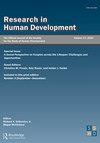“TAKING THE EMPATHY TO AN ACTIVIST STATE”: ALLY DEVELOPMENT AS CONTINUOUS CYCLES OF CRITICAL UNDERSTANDING AND ACTION
IF 1.4
4区 心理学
Q4 PSYCHOLOGY, DEVELOPMENTAL
引用次数: 6
Abstract
Allies are individuals who take action to end oppression in areas in which they have privilege. Although research on ally development is growing, prior research has often conceptualized allies in a binary fashion (privileged or oppressed), focused on only one specific area of privilege (e.g., race, as in White privilege), been limited to one specific context of development (e.g., college), or examined influences rather than developmental processes. We used a constructivist grounded theory approach to address the question “What is the process of being and becoming an ally?” Through a constant comparative analysis approach, we analyzed 28 semi-structured depth interviews with community participants age 26 to 73 from diverse racial, social status, and sexual identities. Results indicated that developing as allies was a lifelong process, with iterative cycles of understandings and action. Understandings of privilege and oppression were developed through education and relational learning and included understandings of concepts and systems, personal positionality, and cognitive and emotional empathy. These understandings contributed a sense of capability and multiple motivations (responsibility and integrity, relational connectedness, and personal healing and growth) that moved participants into action. Taking action also involved an iterative cycle, including active processes of deciding whether and how to intervene; action engagement with people who are privileged as well as those who are oppressed; and evaluating action. This second cycle catalyzed processes of seeking further understandings. Findings from this study have implications for future research examining ally development across the lifespan and developing interventions to foster ally development to advance social justice.“把同理心带到一个积极的国家”:盟友的发展是批判性理解和行动的连续循环
盟友是指在他们享有特权的地区采取行动结束压迫的个人。尽管对盟友发展的研究越来越多,但先前的研究往往以二元方式(特权或受压迫)对盟友进行概念化,只关注特权的一个特定领域(例如,种族,如白人特权),局限于一个特定的发展背景(例如,大学),或考察影响而非发展过程。我们使用基于建构主义的理论方法来解决“成为盟友和成为盟友的过程是什么?”这个问题。通过持续的比较分析方法,我们分析了28次半结构化的深度访谈,对象是年龄在26岁至73岁之间的社区参与者,他们来自不同的种族、社会地位和性身份。结果表明,作为盟友的发展是一个终生的过程,有着反复的理解和行动循环。对特权和压迫的理解是通过教育和关系学习发展起来的,包括对概念和系统、个人立场以及认知和情感移情的理解。这些理解促成了一种能力感和多种动机(责任和正直、关系联系以及个人治愈和成长),促使参与者采取行动。采取行动还涉及一个反复循环,包括决定是否干预以及如何干预的积极过程;与享有特权的人和受压迫的人进行行动接触;以及评估行动。第二个循环促进了寻求进一步理解的过程。这项研究的发现对未来的研究具有启示意义,该研究考察了整个生命周期的盟友发展,并制定了促进盟友发展以促进社会正义的干预措施。
本文章由计算机程序翻译,如有差异,请以英文原文为准。
求助全文
约1分钟内获得全文
求助全文

 求助内容:
求助内容: 应助结果提醒方式:
应助结果提醒方式:


